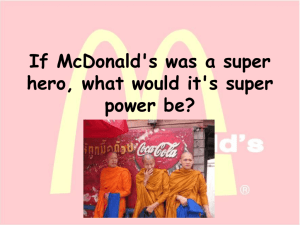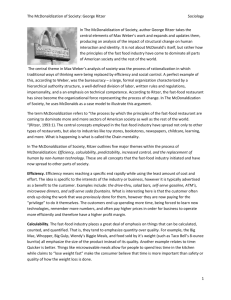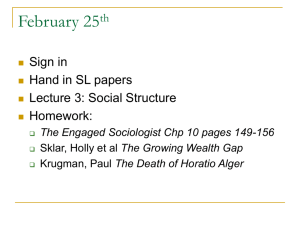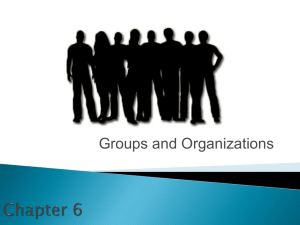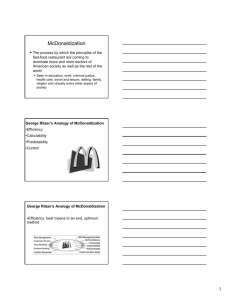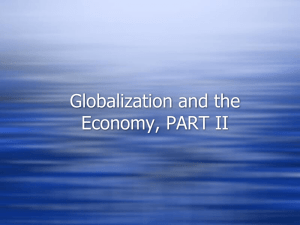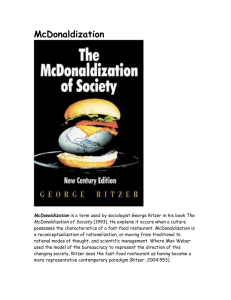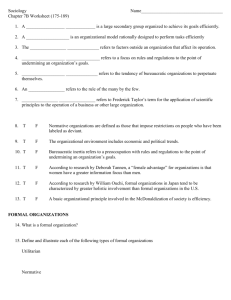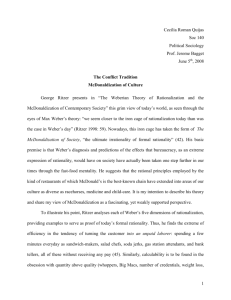english portfolio 2 - pierce
advertisement
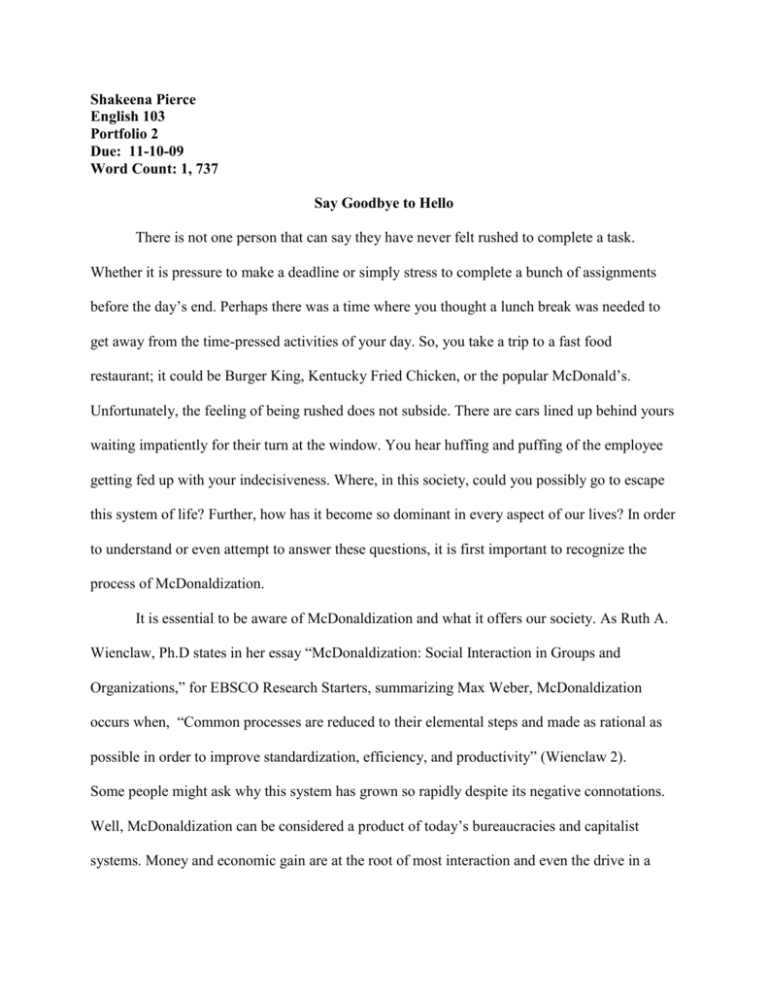
Shakeena Pierce English 103 Portfolio 2 Due: 11-10-09 Word Count: 1, 737 Say Goodbye to Hello There is not one person that can say they have never felt rushed to complete a task. Whether it is pressure to make a deadline or simply stress to complete a bunch of assignments before the day’s end. Perhaps there was a time where you thought a lunch break was needed to get away from the time-pressed activities of your day. So, you take a trip to a fast food restaurant; it could be Burger King, Kentucky Fried Chicken, or the popular McDonald’s. Unfortunately, the feeling of being rushed does not subside. There are cars lined up behind yours waiting impatiently for their turn at the window. You hear huffing and puffing of the employee getting fed up with your indecisiveness. Where, in this society, could you possibly go to escape this system of life? Further, how has it become so dominant in every aspect of our lives? In order to understand or even attempt to answer these questions, it is first important to recognize the process of McDonaldization. It is essential to be aware of McDonaldization and what it offers our society. As Ruth A. Wienclaw, Ph.D states in her essay “McDonaldization: Social Interaction in Groups and Organizations,” for EBSCO Research Starters, summarizing Max Weber, McDonaldization occurs when, “Common processes are reduced to their elemental steps and made as rational as possible in order to improve standardization, efficiency, and productivity” (Wienclaw 2). Some people might ask why this system has grown so rapidly despite its negative connotations. Well, McDonaldization can be considered a product of today’s bureaucracies and capitalist systems. Money and economic gain are at the root of most interaction and even the drive in a majority of lives. Weber suggested that as society became more modern, our “customs and traditions” would be replaced by rationally developed processes (Wienclaw 2). For example things like eating dinner with your family, has been replaced with stopping at a McDonald’s on the way home. George Ritzer explains in a portion of his novel The McDonaldization of Society, published in 1995 by Pine Forge Press, it is merely “a way for organizing activities, calculated to maximize efficiency by minimizing opportunities for error” (Ritzer 1). Keep this in mind as various things we encounter everyday will be exposed for revealing an essence of McDonaldization. Furthermore, consider how the future of human interaction will fair in the hands of the increased automation and systematic forces that permeate our world. Experts have identified four major dimensions of this process that have allowed it to become irresistible as an influence in our society. McDonaldization offers efficiency, calculability, predictability, and control. As with anything, McDonaldization has its pros and cons. Its benefits are rooted in the gain acquired by society and highlight consumerism. Nowadays people will do whatever it takes to get ahead and the McDonaldization of our society emphasizes this concept. Today, we want what we want, when we want it; McDonaldization provides us with just that, efficiency. “Efficiency that is the hallmark of such organization allows frequently time-pressed 21st century individuals to reduce the amount of time that they need to wait in line and receive a product” (Wienclaw 3). Either we don’t seem to realize, or have grown accustomed to the fact that in exchange for speed and efficiency, we give up quality. This is where the calculability aspect comes into play. There’s no way we will receive a product of the best quality if the process by which it is made is calculated down to the shortest amount of time possible. But, one would rather be in and out of the store in a reasonable amount of time than have to sit and wait for their product to be made well. This is why people are more likely to phone their orders into pizza shops or others places like it, so that when they get there the product will have already been made and it will seem as though everything is running efficiently. If a customer arrives before their food is finished being prepared and they feel they have given an adequate amount of time, there could be problems. But, predictability makes up for a large amount of McDonaldization’s influence. No matter what, where, or when you order something, it is guaranteed that the item you receive will be no different from where you could get it elsewhere. Lastly, there is the control factor that McDonaldization implements into our society. Not only does it control “the processes by which the food is prepared and delivered…but even the actions of the employees—and in some regards the customers…” (Wienclaw 3). If you go to any restaurant to sit down and eat, the first thing your waiter is likely to ask is “Can I start you off with a drink?” or some other prescribed line. You, having done this before, have grown accustomed and prepare your answers well before even being asked. Here, not only do we see the control simply being in a restaurant has on our actions, but we also see how relations have grown evermore simplified. There is no small talk; we are simply interacting to play a role that society has constructed for us. If one were to change the role, or act out of character, in other words, deviate from the norm, things would become disheveled. Due to this, there are visible implementations in society that are used to prevent this deviance. Perhaps this is why most places that serve customers run on the principle that “customers come first.” If a customer complains, the employee is supposed to do anything in their power to please them and make them happy. When this does not occur, there is usually conflict. Based on this insight and new breadth of knowledge, I developed a curiosity in exploring the places where we could see the prevalence of McDonaldization. At the University of Richmond, there are two main places to dine. These include Tyler’s Grill and the Dining Hall, otherwise known as “The Grill” and “D-Hall,” respectively. Since some sort of McDonaldization is present in most aspects of society, especially food-service places, I thought it would be particularly interesting to see how it may show up on a college campus. Not only did I look for signs of or traits of McDonaldization but I also observed the nature of interaction at these places. Starting with D-Hall, I spent day one of my observations for about forty-five minutes around dinner time watching and recording anything that could potentially be of use. I realized that even though D-Hall is in many ways significantly different from a place like McDonald’s, it is often just as predictable. Having to eat at D-Hall for the past few months, I have grown accustomed to the choices that are going to be available. There are even weekly menus made available that increase predictability and keep an element of surprise down. D-Hall is guaranteed to be serving pizza, some type of pasta, and french fries, among other things. One could argue that this could be to ensure that if the selections that do change do not satisfy “customers,” the every-day items will still provide a sense of predictability. If I get a slice of pizza I’m almost positive I know exactly what it’s going to taste like. In fact, I’m often surprised if the pizza tastes any better or worse than I am used to. Not only did I observe traces of McDonaldization in the food choices, but also at the entrance and exit of D-Hall. As the lines form, the hustle and bustle to get your card swiped and place your tray upon the conveyor belt is reminiscent of an assembly line. The smell of conformity permeates the air as we all line up one after another following each other’s lead. Similarly, The Grill showed evidence of this process. I would have to say that it seems as though the Grill resembles McDonaldization more heavily than D-Hall. You see efficiency in the cash register, which has a button for each item on the menu, increasing the speed of transactions and interactions. I could see the pressure one felt as they waited in line, to choose what they wanted so that they would be ready when it was their turn. There is control not only of the employees here, but also in some of the actions of the customers. Encouraging us to make our selections into a “meal,” for what at face-value, appears to be only a small price, is done to reduce our actions and add to the predictability of our interactions. Customers here are to line up inside one of two barriers, either on the right or the left. In D-Hall, although there are lines, people line up more freely. Ritzer notes that “Assembly lines are hardly human settings in which to eat, and they have been shown to be inhuman settings in which to work” (Ritzer 3). But, still we see a resemblance of these conditions at the Grill. Perhaps this is why the average time one spends to eat at the Grill, ten to twelve minutes, is significantly lower than that of D-Hall, which had an average of thirty to forty-five minutes. The nature of the place without a doubt affects the character of interaction and relations between people. While we may see the increased systematization of society, we fail to realize that as a result, we too have become systemized. Why do we line up in lines? Why do we settle for dealing with automated machines rather than speaking with real people? McDonaldization has been able to, “Exert greater control through non-human technologies over both employees and customers, leading them to behave the way the organization wishes them to” (Ritzer 3). Picture this in the scope of our future. If the rate of McDonaldization in our society does not come to a stop we risk the simplification of not only our interactions with society, but also with ourselves. Weber suggests that McDonaldization “could eventually reduce the ability of human beings to use their creative and imaginative powers and their ability to do things for themselves” (Wienclaw 1). But who would be willing to give up things like a calculator, or an ATM machine? Although seemingly extreme, the conditions of control expressed in the novel Brave New World depict an idea of what our world would be like if we let this systematization go too far. Writer’s Memo Let me just start by saying that this portfolio was a lot more difficult than the first. Perhaps that is the idea, for the portfolio’s to increase in difficulty as the course progresses and tackles more challenging concepts. In the beginning, I wasn’t sure what the whole concept of the portfolio was or even what was expected. I think this probably made it even harder for me because I ended up delaying getting started. But, above all, I’m glad a decision was made to extend the due date and devote class time to portfolio workshops. I think the hardest thing for me was finding a focus. There’s so much to say about McDonaldization, and there is also a lot that has already been said. Again, with this portfolio, I had trouble developing a thesis that wasn’t too vague, broad, and that addressed new, original ideas and concepts. It’s is so easy to be influenced by things you’ve read and I’ve come to realize that in high school, there was not much emphasis put on engaging in conversation with outside sources. It was rather more important that you understood what the expert was trying to say and how well you could connect his or her ideas to a text. Along with the dilemmas I faced developing a thesis, came the hassle of organizing my paper in an effective, insightful way. I wasn’t sure where to incorporate my observations or how much background to give on McDonaldization itself. I feel that in some areas I’ve simply restated concepts regarding the process, but could find no other way to incorporate this information. In order to understand or make sense of my observations and how they relate to McDonaldization I felt it necessary to first give background and then present my observations along with some critical points from expert sources. All in all, I’m satisfied with the finished product. After reflecting, I feel that I have improved my writing skills, but recognize that there is still a good bit of ground I need to cover. Works Cited Ritzer, George. "The McDonald's System." Republished in Readings for Sociology from The McDonaldization of Society p. 9-17 Copyright 1992. Wienclaw Ph.D, Ruth A. "McDonaldization: Social Interaction in Groups & Organizations." Research Starters: Academic Topic Overviews. EBSCO Publishing Inc. Web. 27 Oct. 2009. Works Consulted Bryman, Alan. "The Disneyization of Society." The Editorial Board of the Sociological Reviw (1998): 25-44. 27 October 2009.

